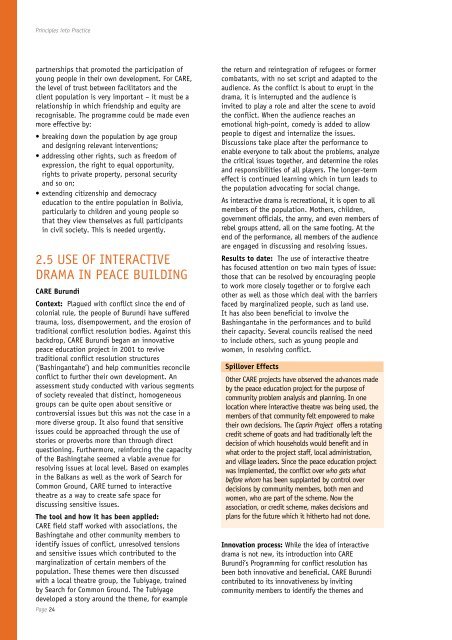Principles into Practice - Handicap International
Principles into Practice - Handicap International
Principles into Practice - Handicap International
- No tags were found...
You also want an ePaper? Increase the reach of your titles
YUMPU automatically turns print PDFs into web optimized ePapers that Google loves.
<strong>Principles</strong> <strong>into</strong> <strong>Practice</strong>partnerships that promoted the participation ofyoung people in their own development. For CARE,the level of trust between facilitators and theclient population is very important – it must be arelationship in which friendship and equity arerecognisable. The programme could be made evenmore effective by:• breaking down the population by age groupand designing relevant interventions;• addressing other rights, such as freedom ofexpression, the right to equal opportunity,rights to private property, personal securityand so on;• extending citizenship and democracyeducation to the entire population in Bolivia,particularly to children and young people sothat they view themselves as full participantsin civil society. This is needed urgently.2.5 USE OF INTERACTIVEDRAMA IN PEACE BUILDINGCARE BurundiContext: Plagued with conflict since the end ofcolonial rule, the people of Burundi have sufferedtrauma, loss, disempowerment, and the erosion oftraditional conflict resolution bodies. Against thisbackdrop, CARE Burundi began an innovativepeace education project in 2001 to revivetraditional conflict resolution structures(‘Bashingantahe’) and help communities reconcileconflict to further their own development. Anassessment study conducted with various segmentsof society revealed that distinct, homogeneousgroups can be quite open about sensitive orcontroversial issues but this was not the case in amore diverse group. It also found that sensitiveissues could be approached through the use ofstories or proverbs more than through directquestioning. Furthermore, reinforcing the capacityof the Bashingtahe seemed a viable avenue forresolving issues at local level. Based on examplesin the Balkans as well as the work of Search forCommon Ground, CARE turned to interactivetheatre as a way to create safe space fordiscussing sensitive issues.The tool and how it has been applied:CARE field staff worked with associations, theBashingtahe and other community members toidentify issues of conflict, unresolved tensionsand sensitive issues which contributed to themarginalization of certain members of thepopulation. These themes were then discussedwith a local theatre group, the Tubiyage, trainedby Search for Common Ground. The Tubiyagedeveloped a story around the theme, for examplePage 24the return and reintegration of refugees or formercombatants, with no set script and adapted to theaudience. As the conflict is about to erupt in thedrama, it is interrupted and the audience isinvited to play a role and alter the scene to avoidthe conflict. When the audience reaches anemotional high-point, comedy is added to allowpeople to digest and internalize the issues.Discussions take place after the performance toenable everyone to talk about the problems, analyzethe critical issues together, and determine the rolesand responsibilities of all players. The longer-termeffect is continued learning which in turn leads tothe population advocating for social change.As interactive drama is recreational, it is open to allmembers of the population. Mothers, children,government officials, the army, and even members ofrebel groups attend, all on the same footing. At theend of the performance, all members of the audienceare engaged in discussing and resolving issues.Results to date: The use of interactive theatrehas focused attention on two main types of issue:those that can be resolved by encouraging peopleto work more closely together or to forgive eachother as well as those which deal with the barriersfaced by marginalized people, such as land use.It has also been beneficial to involve theBashingantahe in the performances and to buildtheir capacity. Several councils realised the needto include others, such as young people andwomen, in resolving conflict.Spillover EffectsOther CARE projects have observed the advances madeby the peace education project for the purpose ofcommunity problem analysis and planning. In onelocation where interactive theatre was being used, themembers of that community felt empowered to maketheir own decisions. The Caprin Project offers a rotatingcredit scheme of goats and had traditionally left thedecision of which households would benefit and inwhat order to the project staff, local administration,and village leaders. Since the peace education projectwas implemented, the conflict over who gets whatbefore whom has been supplanted by control overdecisions by community members, both men andwomen, who are part of the scheme. Now theassociation, or credit scheme, makes decisions andplans for the future which it hitherto had not done.Innovation process: While the idea of interactivedrama is not new, its introduction <strong>into</strong> CAREBurundi’s Programming for conflict resolution hasbeen both innovative and beneficial. CARE Burundicontributed to its innovativeness by invitingcommunity members to identify the themes and

















